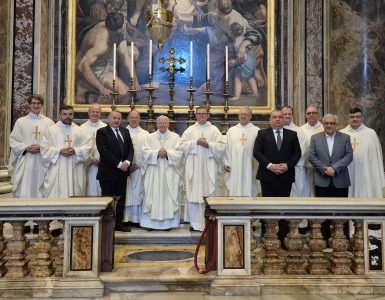St. Francis of Assisi is the most “popular” saint in the Church, if any can or should be called such. The religious order(s) he founded went on to become the largest in the history of the Church. St. Francis’ impact on the Church, and on the world, has been enormous. Beyond all the over-sentimentalization of this truly holy man, the garden statues, the “nature-lover” moniker, the stories of preaching to the birds and making friends with wolves, is a simple and profound witness to Christ, above all else. After his conversion, the saint from Assisi truly strove to imitate Christ in his own life, in everything that he did. In him, we can see that it is possible for a human being to actually do this. Maybe that is why we have come to love him so much.
“Francis of Assisi is not for everyone. Even many saints would not be comfortable with Francis. He appeals primarily to the heart. He would never be accused of being lukewarm, for he lived his life afire. Francis found God in real life. He led a life of radical devotion to God and to service of other people, especially poor people.
Typically, Francis attracts the average person more than the scholar. Devotions popular with many Catholics are associated with Francis. The Christmas crib or Nativity scene, Stations of the Cross, the Stigmata, and the garden statues surrounded by birds and flowers, to name a few.
Francis found his inspiration in the Gospels. More precisely, he found it in the stories in which Jesus walked among the people of the streets and talked with equal ease to children, tax collectors, lepers, foreigners, and Pharisees. Francis experienced the good news in the flesh in poor people and in needy people, in fig trees and in mustard seeds, in sheep and in goats. In short, Francis practiced an incarnational, sacramental spirituality.
To say that Francis’ vision is sacramental means simply that he was always drawn to life, to the preciousness of the everyday. He shunned intellectualizing and instead looked for God in the flesh, in the earth, and in simple things. He preferred to pray with his feet, with his hands, and with his voice raised in song. Not only did Francis meditate on the suffering of Jesus, but he bore the wounds of Jesus in his very flesh when he received the stigmata.”
– excerpt from the book “Praying with Francis of Assisi”
We want to share this short excerpt with you, in rememberance and honor of St. Francis:
“Many sayings are attributed to St. Francis of Assisi, but were never actually written by him. One of the more famous of these has to do with preaching without words. “Preach the Gospel at all times and, if necessary, use words.” This particular one is actually based on a combination of what St. Francis said and taught.
“But as for me, I desire this privilege from the Lord, that never may I have any privilege from man, except to do reverence to all, and to convert the world by obedience to the Holy Rule* rather by example than by word.”
*”The Holy Rule” is the Rule of St. Francis.This excerpt is courtesy of the Franciscan Online Archives.
The Praises of God by Saint Francis of Assisi:
“You are the holy Lord God Who does wonderful things.
You are strong. You are great. You are the most high.
You are the almighty king. You holy Father, King of heaven and earth.
You, are three and one, the Lord God of gods; You are the good,
all good, the highest good, Lord God living and true.
You are love, charity; You are wisdom, You are humility;
You are patience, You are beauty, You are meekness;
You are security, You are rest; You are gladness and joy, You are our hope, You are justice;
You are moderation, You are all our riches to sufficiency.
You are beauty, You are meekness;
You are the protector, You are our custodian and defender;
You are strength, You are refreshment. You are our hope;
You are our faith, You are our charity; You are all our sweetness,
You are our eternal life, Great and wonderful. Lord, Almighty God, Merciful Savior. ”
St. Francis, your example and your witness to Our Lord are still with us today. Remember us and pray for us!





